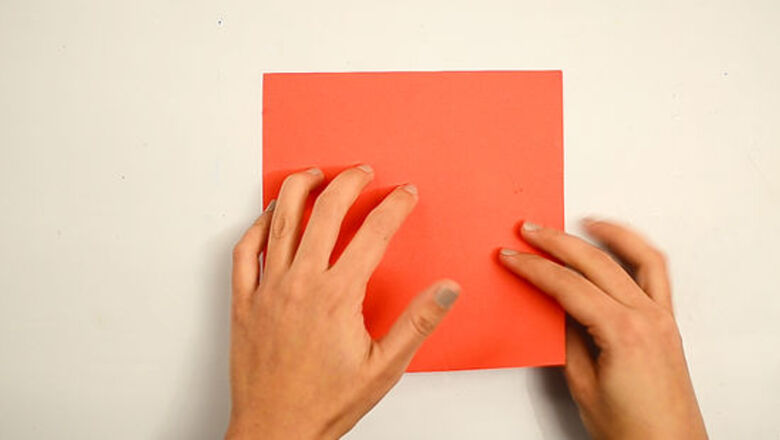
views
Cutting a Paper Rose
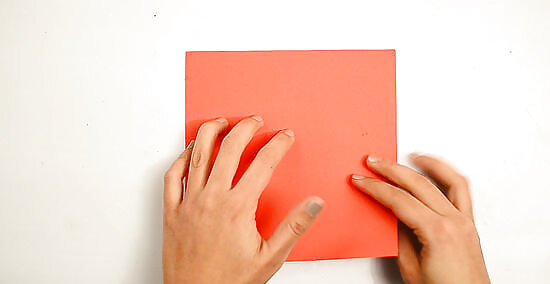
Cut four 4 in (10 cm) squares out of paper. Start with a larger, square sheet of paper. Fold it into fourths, then unfold it. Use the crease marks as a guide to cut the paper apart into 4 smaller squares. Make each square about 4 in (10 cm). If you want a larger rose, you can just use 4 sheets of origami paper instead. Red, pink, and white are popular rose colors, but you can make yours any color you want.
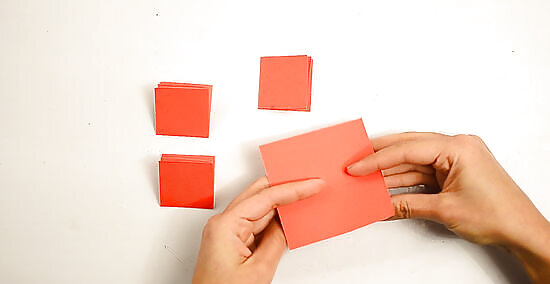
Fold the squares into fourths, then in half to make diamonds. Take your first square and fold it in half horizontally. Fold it in half again going vertically. Finally, fold the square in half diagonally to make a diamond or triangle-like shape. Do this for all 4 squares. If you are using origami paper with a white side and a colored side, it does not matter which side is facing out. Run your fingernail across each fold as you complete it to make the creases nice and sharp. These will be your cutting guides!
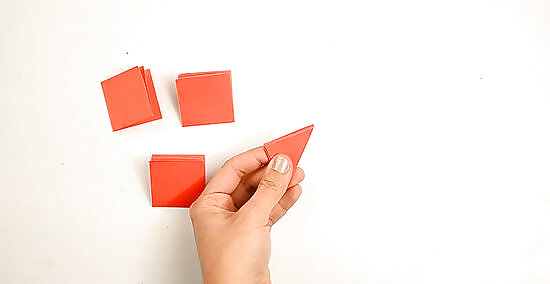
Trim the diamonds to make teardrop shapes, then unfold them. Rotate your first diamond so that the non-folded edge is on top and the folded edge is on the bottom. Cut the non-folded edge off at a curve so that the diamond looks like an ice cream cone or an upside-down teardrop. When you’re done, unfold the paper. Do this for all 4 diamonds. Your folded diamonds will have a set of folded edges and a set of cut/non-folded edges. Snip the bottom point off of each diamond. This will make it easier to add the stem!
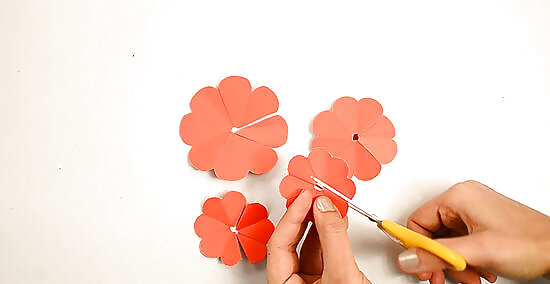
Cut increasingly larger segments from each flower shape. When you unfold your teardrop shapes, they will turn into flowers with creases in them. Between each set of creases is a wedge-shaped segment. Use the creases as cutting guides to remove the following segments from each flower: Flower 1: 1 segment Flower 2: 2 segments Flower 3: 3 segments Flower 4: 4 segments
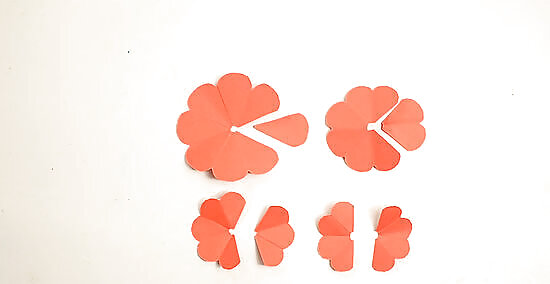
Discard segments 1, 2, and 4, and keep the rest. After you cut the segments out, you’ll end up with 8 pieces, but you don’t need that many to make your rose. Instead, discard the 1- and 2-segment pieces, and one of the 4-segment pieces. Keep the 3-segment piece. By the end, you should have a: 7-segment flower 6-segment flower 5-segment flower 4-segment flower 3-segment flower
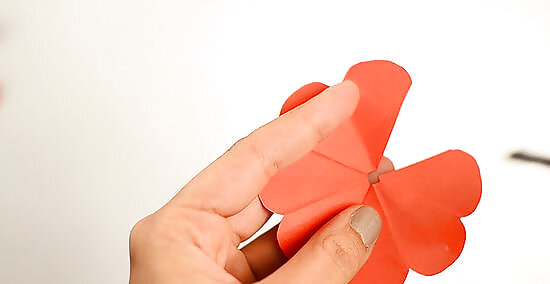
Glue the gaps shut on each flower, except for the 3-segment one. Take your 7-segment flower. Coat the first segment above the wedge-shaped gap with glue. Overlap it with the last segment below the wedge-shaped gap to create a cone shape. Repeat this step for the 6-segment, 5-segment, and 4-segment flowers. Leave the 3-segment flower as-is. Liquid glue and glue sticks will work great for this. If you’re using liquid glue, however, be sure to only apply a thin layer. Give the flowers time to dry. If you need to, secure the overlapping segments with paper clips or clothespins.
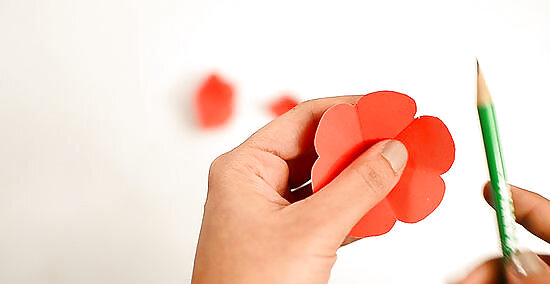
Curl the tips of the petals with a pencil to make them more realistic. Take your first petal cup and hold a pencil under one of the petals. Wrap the tip of the petal around the pencil, then slide the pencil out. Finish all of the petals on the first cup, then move onto the next. You only need to do this for the cone pieces; leave the 3-segment piece alone. Don’t worry if the petals don’t curl by the same amount. A little imperfection is common in nature!
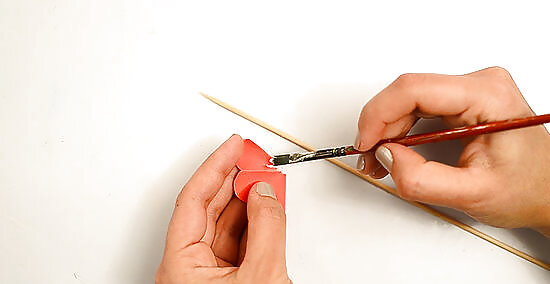
Wrap and glue the 3-segment flower around the tip of a skewer. Coat 1 of the diagonal edges on your 3-segment piece with glue. Wrap it around the end of a skewer to secure it, then finish wrapping the segment. Glue down the other edge, then hold it until it dries. If you don’t want a stemmed rose, just wrap the 3-segment flower into a tube, from one end to the other, then secure it with glue.
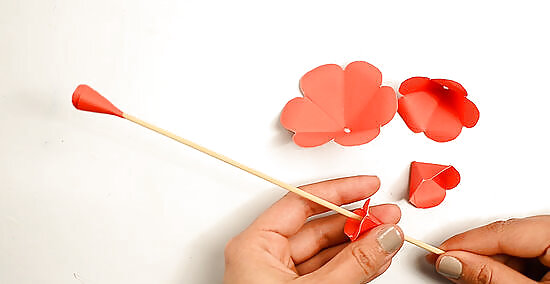
Slide the other petals onto the skewer in increasing order. Take your 4-segment flower and slide it onto the skewer. Push it up so that it’s right under the 3-segment flower. Follow up with the 5-segment, 6-segment, and 7-segment flowers. Be sure to off-set the petals so that they end up between each other rather than on top. This will give your rose a fuller, more realistic look. If you didn’t add a skewer, just stack and hot glue the petals together in the center. Cut the bottom off of the 3-segment petal, and glue it in the center. If the skewer is not sharp enough to poke through the petals, use an awl or thick needle to poke the holes instead. Make sure that they’re centered!
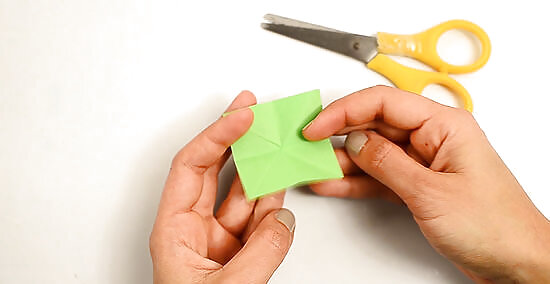
Glue a green, star-shaped piece of paper to the bottom of the rose. Cut a multi-pointed star shape from a 2 in (5.1 cm) green piece of paper. Poke a hole in the middle, then add it to the skewer. Slide it up the skewer until it touches the bottom of the rose. Secure the star-shape with some glue if desired. If you omitted the skewer stem on your rose, you can just glue your rose to whatever flat surface you want.
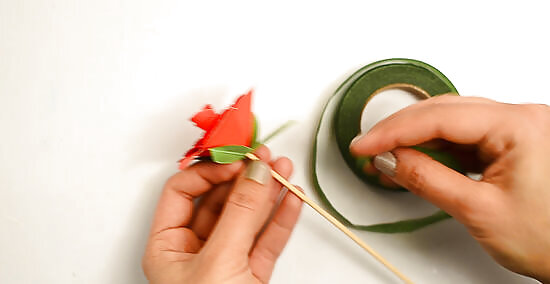
Wrap green floral tape around the skewer to make it look like a stem. Begin wrapping the tape at the base of the rose. Wrap it 2 to 3 times first, so that the rose doesn’t slide down, then begin to wrap it in a downward spiral towards the other end of the skewer. Overlap the tape by a little with each wrap so that you can’t see the skewer. Wrap the tape tightly. This will help it stick to itself as well as the skewer.
Rolling a Fabric Rose
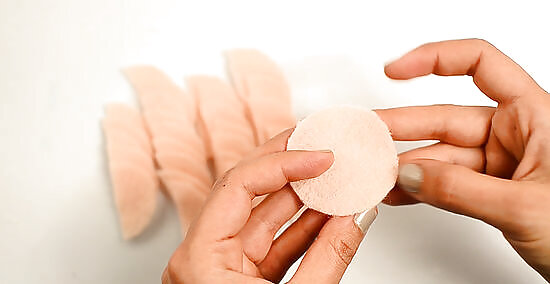
Cut 36 4.5 cm (1.8 in) wide semicircles out of felt. Start with 18, 4.5 cm (1.8 in) wide full circles first, then fold and cut each circle in half to create 36 semicircles. Use a compass, a large coin, or a small jar to trace the circles. They don't have to be exactly 4.5 cm (1.8 in), but they should all be the same size. You can try this with chiffon or satin, but you need to singe the cut edges with a flame so that they don’t fray. Red, pink, or white are great colors for roses, but you can make yours using any color you want.
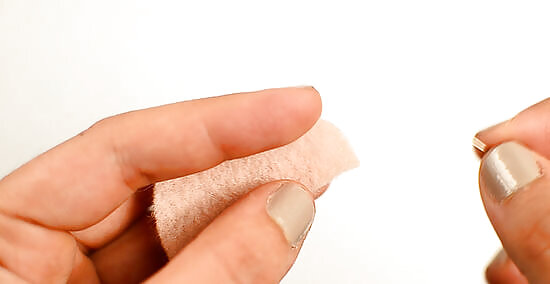
Sew a running stitch halfway across the bottom of the first semicircle. Cut a piece of thread that’s about 81 cm (32 in) long. Pull it through a needle, then knot the end. Weave the needle up and down through the felt along the bottom edge. Start at 1 end of the semicircle and finish halfway across the bottom edge. Sew as close as possible to the bottom edge. Don’t double the thread; you need the full length in order to gather the finished strip. To make the thread easier to work with, move the needle so that it is a little over halfway across the thread. This makes the working thread shorter.
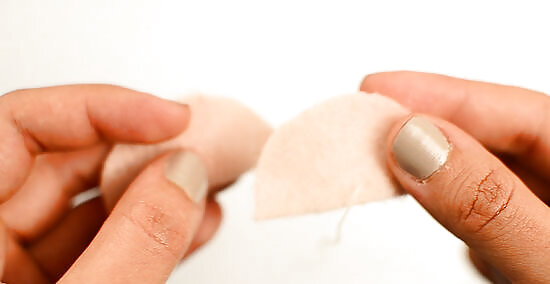
Add your second semicircle under it, overlapping it halfway. The end of the second semicircle should be halfway across the bottom edge of the first semicircle, right where you finished sewing. Make sure that both bottom edges are aligned. If you used fabric with a front and back side, make sure that the front side for both pieces is facing up.
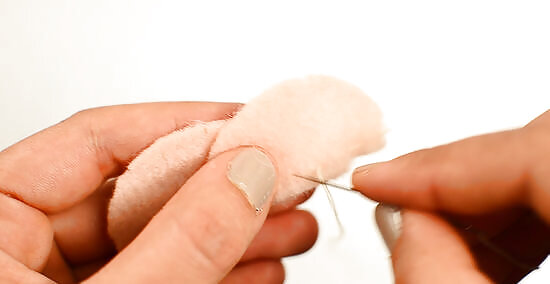
Sew halfway across the second semicircle, then add the next one. Push the needle through both semicircles, then continue to sew across the bottom edge of the second semicircle. When you are halfway across the second semicircle, stop sewing and add the next semicircle. When you are sewing the semicircles, make sure that you sew through both layers of felt. By the time you reach the middle of the second semicircle, you should be done with the first semicircle. When adding the third semicircle, make sure that you add it under the second one.
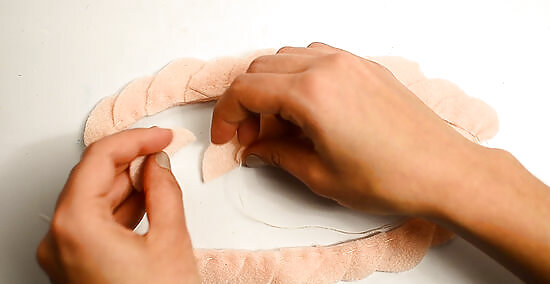
Continue to add and sew semicircles until you’ve used them all up. As you sew, pull your needle along the working thread so that the tail becomes shorter and shorter. At one point, you will have to gather the circles along the thread a little to keep the needle from falling off. Always add the new semicircle under the first one.
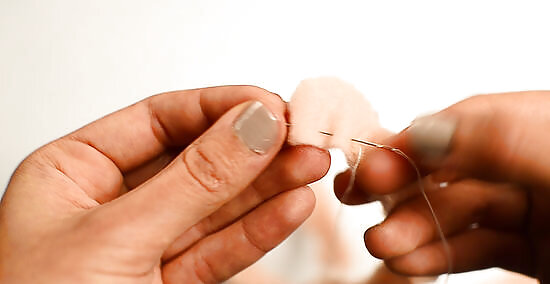
Gather the semicircles along the thread slightly, then knot the thread. Gently pull the thread through the semicircles so that the strand curls into a slight coil, like a C. This will help give your rose a cone shape when you go to roll it into a tube. Be careful not to break the thread when gathering in. Make sure that the gathers are distributed evenly across the bottom edge of the strip. The more you gather the thread, the more open your rose will be. Don’t gather it so much that the strip coils into a full O-shape.
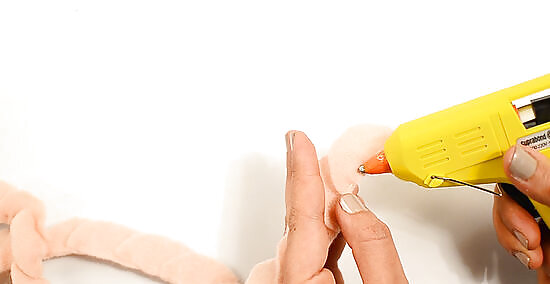
Apply hot glue to the bottom edge as you roll the strip into a tube. Apply a 2.5 cm (0.98 in) line of hot glue to the bottom edge of your very first semicircle. Roll the semicircle into a tight tube, then apply more hot glue to the next semicircle and roll it some more. Continue to apply glue and roll the strip into a tube until you reach the end. If you don’t have hot glue, you can try using fabric glue instead. This completes the rose. When you’re done, you can gently peel the petals away from each other to give it a more open shape.
Folding a Ribbon Rose
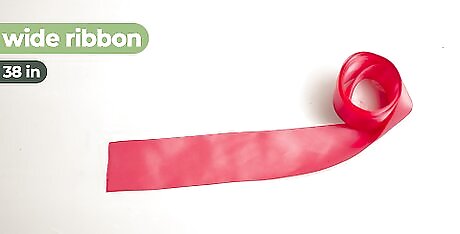
Cut a 38 in (97 cm) piece of 1 ⁄2 in (3.8 cm) wide ribbon. You can use any type of ribbon you want for this, but satin or grosgrain would look lovely. Make sure that the ribbon does not have any wire in it. You can use thinner ribbon or even strips of paper. If your ribbon or paper is thinner, you won’t need the full 38 in (97 cm). If the ribbon has wire in it, pull it out the ends like you would pull out a straw.
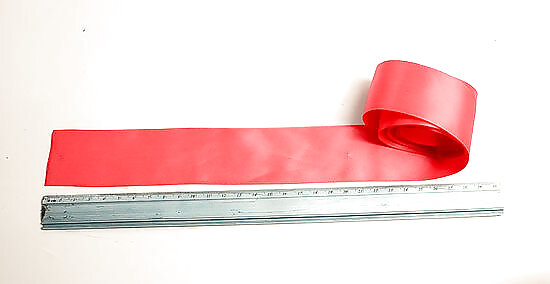
Measure 5 in (13 cm) from the end, then fold the ribbon at a right angle. Orient the ribbon horizontally so that the long edge is facing you. Measure 5 in (13 cm) from the end of the ribbon, then fold the rest of the ribbon up to make a right angle. If the ribbon has a distinct front and back side, make sure that the back is facing you.
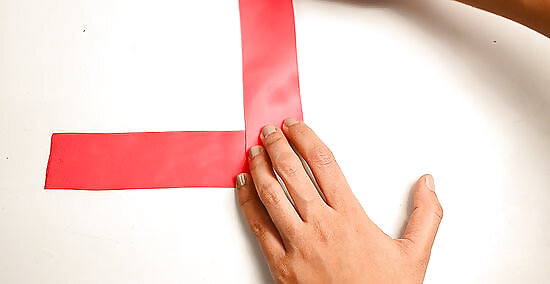
Fold the ribbon at a right angle 3 more times to make a square. Fold the ribbon at a right angle away from the shorter end (left or right), then fold it downward. Fold the ribbon to the opposite side (left or right) to finish the square. This completes your first layer.
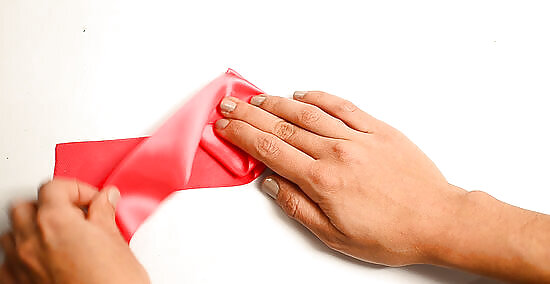
Continue to fold the ribbon into squares until it’s at least 5 layers thick. Each square makes a single layer. When you have about 3 in (7.6 cm) of ribbon left, stop. This will be the bottom of your rose. As you fold the ribbon, try to leave a tiny hole in the center of each square. This will make it easier to assemble the rose. If you have more than 3 in (7.6 cm) of ribbon left over, cut the rest off at an angle.
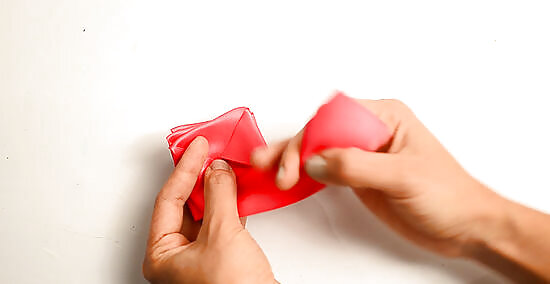
Flip the rose over and pull the 5 in (13 cm) tail through the middle. You may have to twist the tail into a small tube in order to get through the hole. Alternatively, fold a thin wire in half, then use it like a needle to thread the tail through the hole. Be careful not to pull too much of the ribbon through the hole. You just need to pull the first 5 in (13 cm). If you used a wire to pull the ribbon through the hole, be sure to remove it at the end. The 5 in (13 cm) tail should now be on the same side as the other 3 in (7.6 cm) tail.
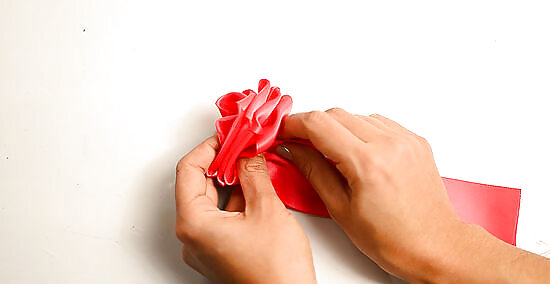
Twist the 5 in (13 cm) tail until the center gathers into a rose. You need to twist the tail in the same direction that the ribbon is twisted in. Look at the front of the rose as you twist. If it starts to tighten, you’re going in the right direction. If it starts to loosen or unravel, go in the opposite direction. How much you twist the ribbon by depends on how tight you want your rose to be. The more you twist, the tighter it’ll be!
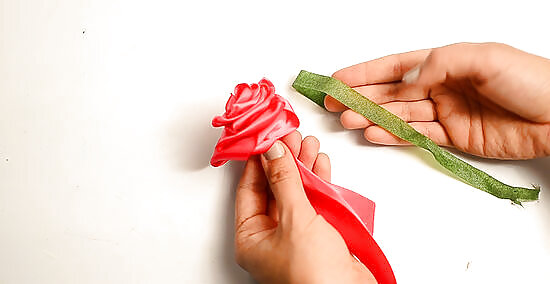
Tie the 2 tails together with a piece of ⁄8 in (0.32 cm) wide ribbon. Cut a piece of ⁄8 in (0.32 cm) wide ribbon that's about 8 in (20 cm). Hold the 2 tails together, then wrap and tie the thinner ribbon around them in a secure, double-knot. Make the knot right at the base of the rose. The color of the thin ribbon does not matter. If you plan on adding the rose to a stem, however, consider using the same color as the rose—or green. If you’d rather leave the rose flat as an applique, cut the tails off just below the tied ribbon, then seal the cut end with hot glue or fabric glue.
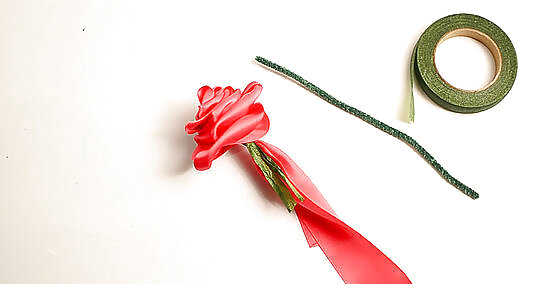
Secure the tails to a pipe cleaner with floral tape. Hold the pipe cleaner and rose tails together so that they resemble a thick stem. Wrap green floral tape around the base of the rose a few times, then continue to wrap it around the pipe cleaners until you reach the bottom. If you can't find a pipe cleaner, use a thick, floral wire stem instead. About 16-gauge should do. Pull the tape tightly as you wrap it. This will help it stick to itself. Be sure to overlap the tape slightly with each wrap. For a more realistic rose, add some fake rose leaves to the stem as you wrap the tape. You can find them in the wedding department of a craft store.
















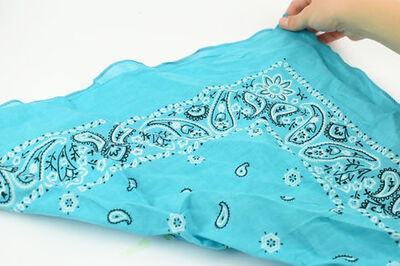


Comments
0 comment